Syrians in the Kurdistan Region of Iraq
Photographs by Eduardo Soteras Jalil, interviews by Rowena McNaughton, Danish Refugee Council
In late February, when winter temperatures still clung to the days, parents around the Syrian refugee camps in Erbil, Kurdistan Region of Iraq (KRI), echoed the same response when asked what their teenage children did each day: “Qias almukhayam tawal alyawm” (“Measuring the camp all day long”).
Sitting, face to face, on the thin coloured mattresses that form the central, and often only, furnishings in most of the tents scattered across the nine refugee camps in KRI, parents admitted worryingly that their children’s lives have become one of inactivity. The fact that their own predicament mirrored their children’s appeared secondary in importance.
Over 39 per cent of Syrian refugee children aged 15-17 are not attending school in Iraq. Until recently, secondary education options did not exist. And while Syrian refugees in KRI can legally work if they have a residency permit, competition from the hundreds of thousands of displaced Iraqis also seeking refuge in KRI, the economic slow-down the oil price free-fall has induced, and few jobs, have made it increasingly difficult for any Syrian to make a living in KRI. Personal savings, after five years on the move for many Syrians, have now long dried up. Of the 246,000 refugees from Syria in Iraq, almost all are living in KRI.
Ground down by the protracted exile and the limbo of living in a refugee camp, the United Nations Refugee Agency reported that some 25,000 Syrian refugees left the KRI last year. Despite the fact that Syrians are welcome in the KRI where they live in so-called “five star” refugee camps, many more are expected to follow this year. Most have returned back to an uncertain life in Syria or, continue on to Europe in search of a better life. “Germany in the Spring” has become a cry for Syrians in Refugee Camps in KRI, determined to not waste their life in idleness.
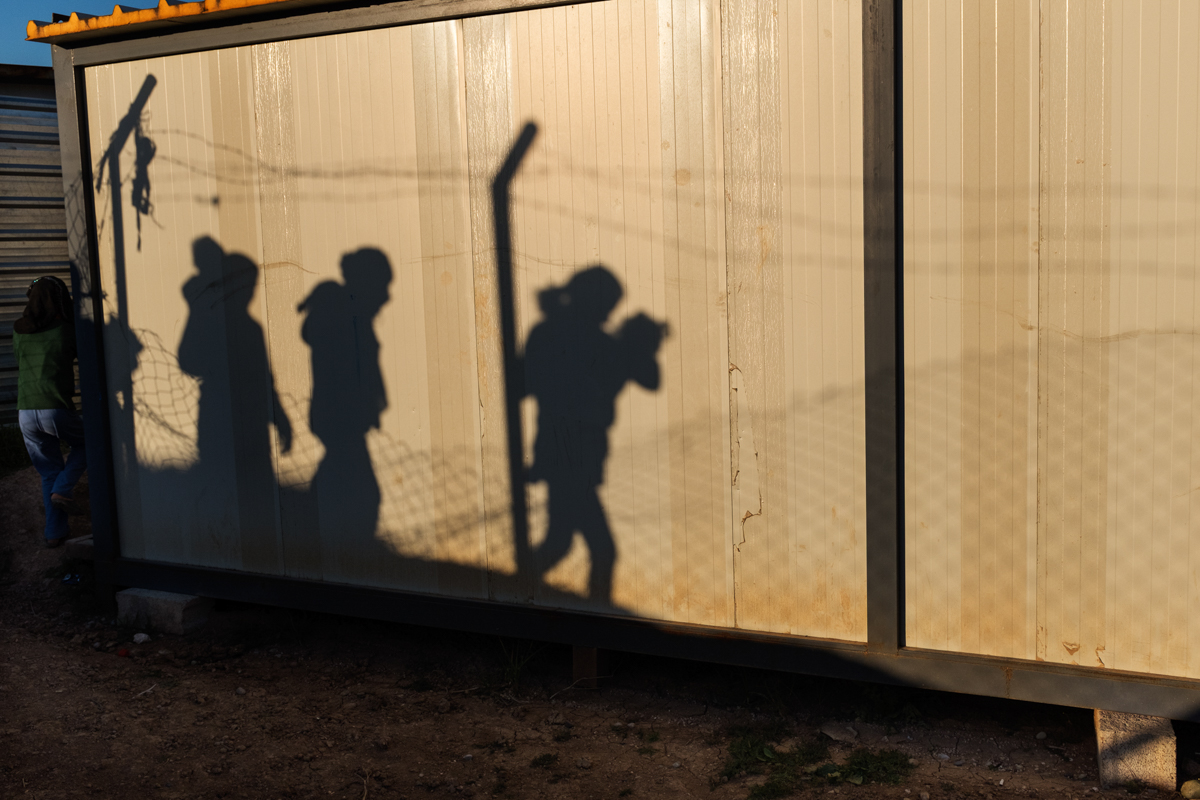
The silhouette of women carrying their young children spills onto a NGO service office in Basherma Refugee Camp.
Erbil, Iraq. February 18, 2016. © Danish Refugee Council/Eduardo Soteras Jalil
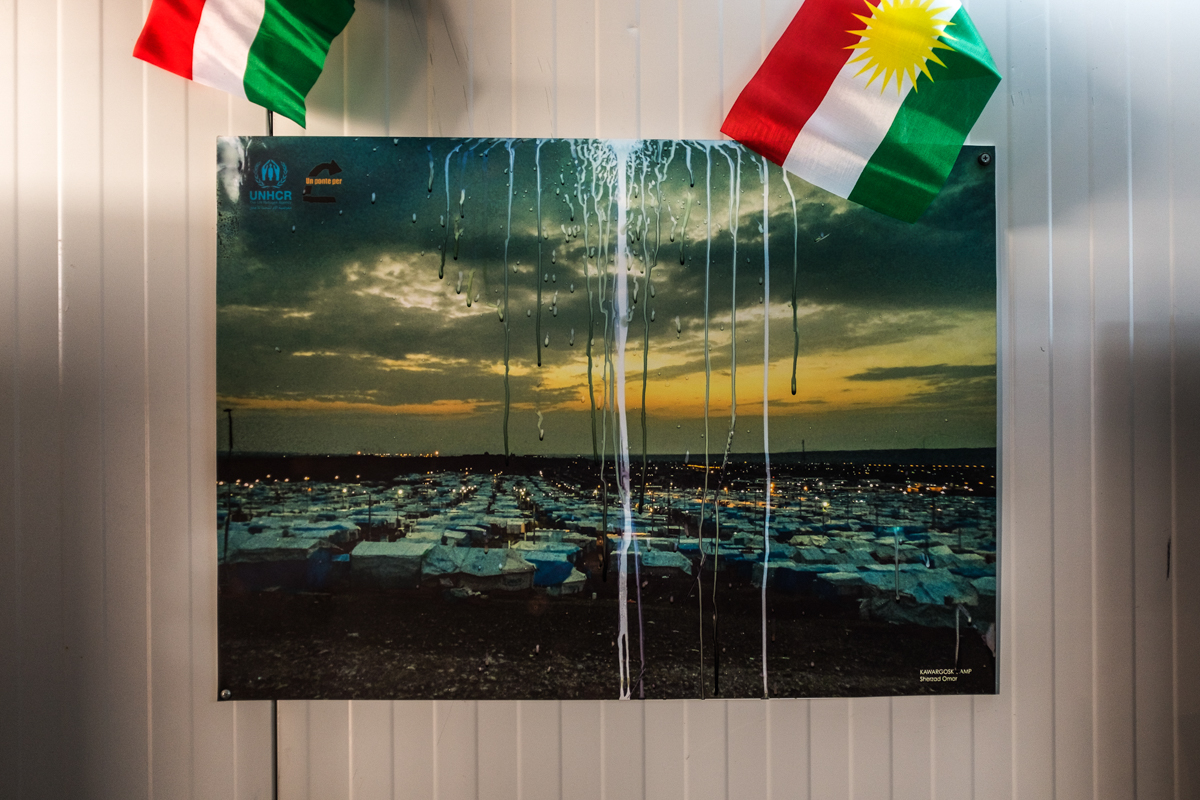
A poster, depicting Kawergosk Refugee camp, at the camp manager’s office.
Erbil, Iraq. February 15, 2016. © Danish Refugee Council/Eduardo Soteras Jalil
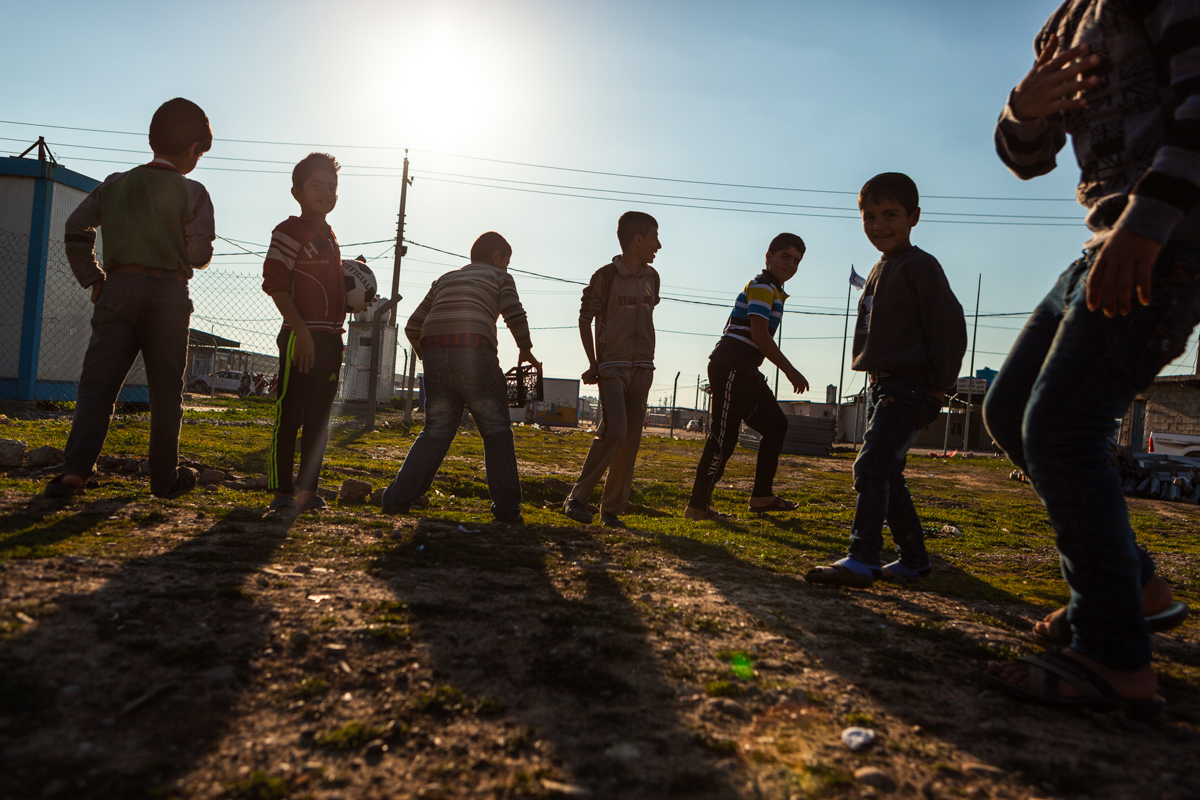
Young boys prepare for their afternoon game of football.
, Kawergosk Refugee Camp, Erbil, Iraq. February 15, 2016. © Danish Refugee Council/Eduardo Soteras Jalil
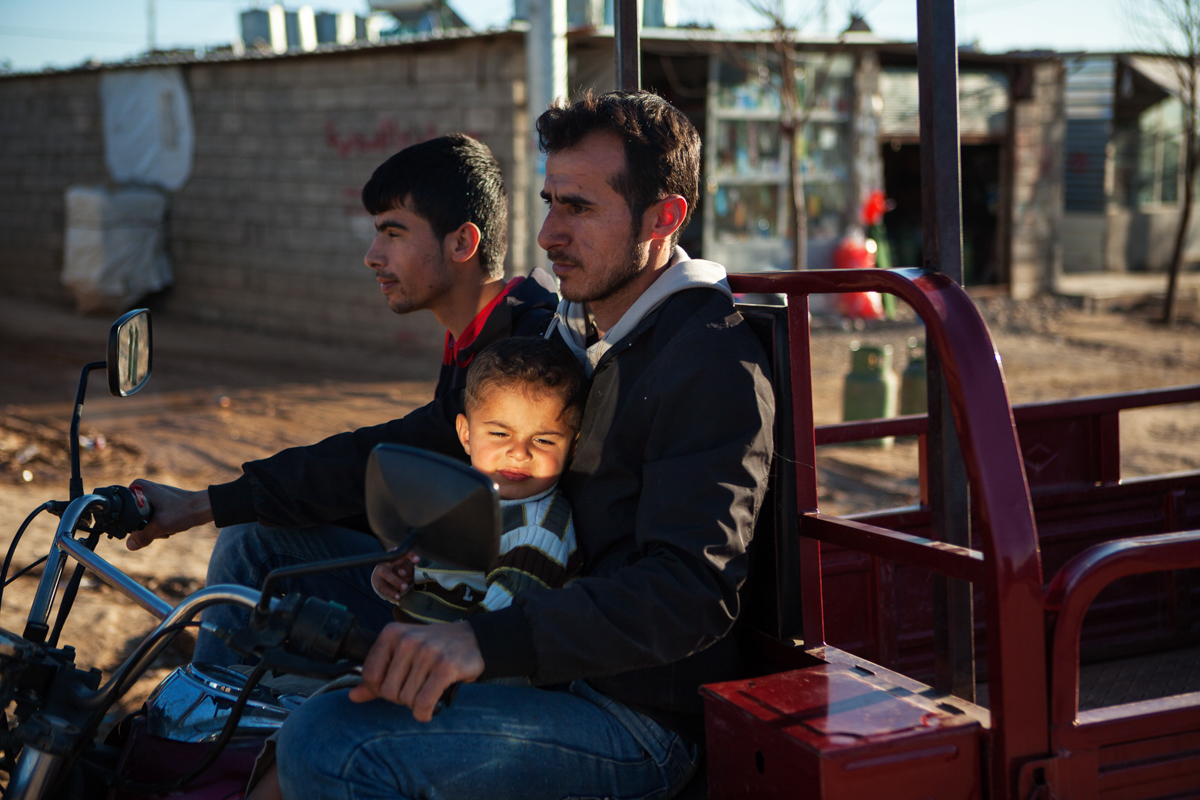
Father and son ride a Tuk-Tuk motorbike through Darashakran Refugee Camp.
Erbil, Iraq. February 16, 2016. © Danish Refugee Council/Eduardo Soteras Jalil
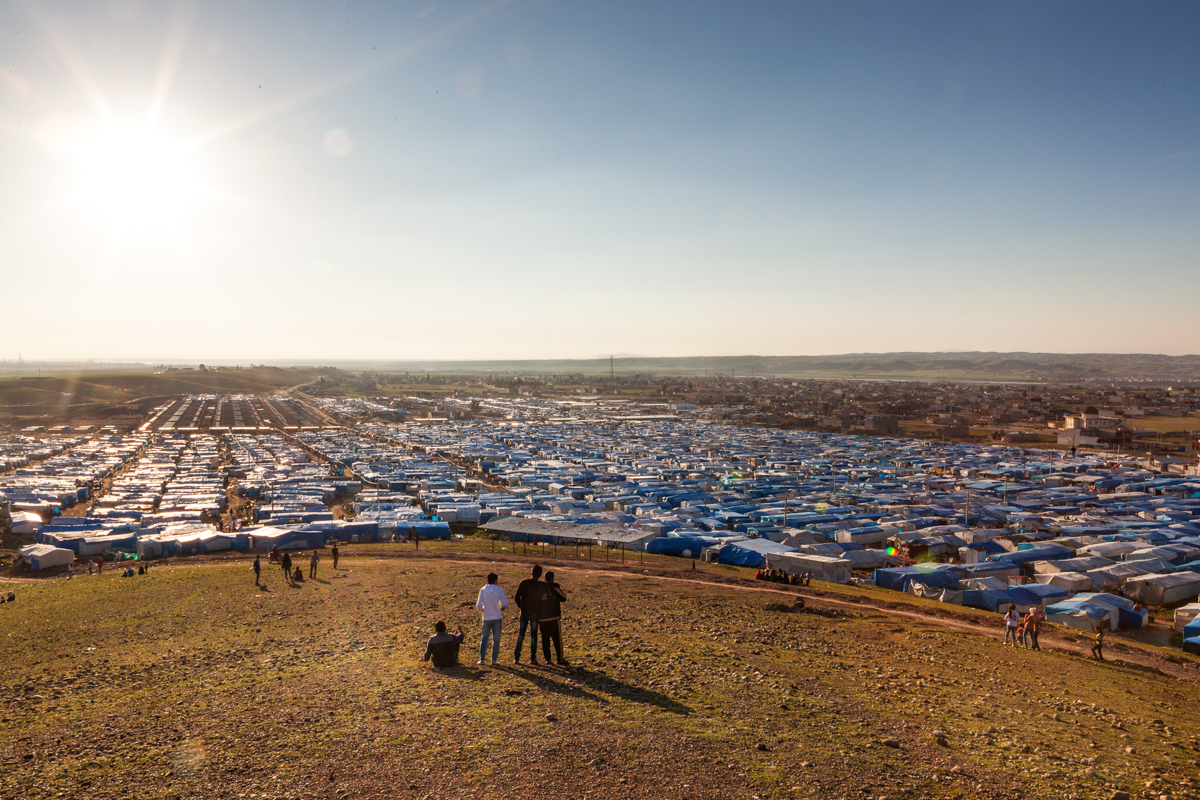
Young men pass their time on a hill overlooking the Kawargosk Refugee Camp they live in.
Erbil, Iraq. February 15, 2016. © Danish Refugee Council/Eduardo Soteras Jalil
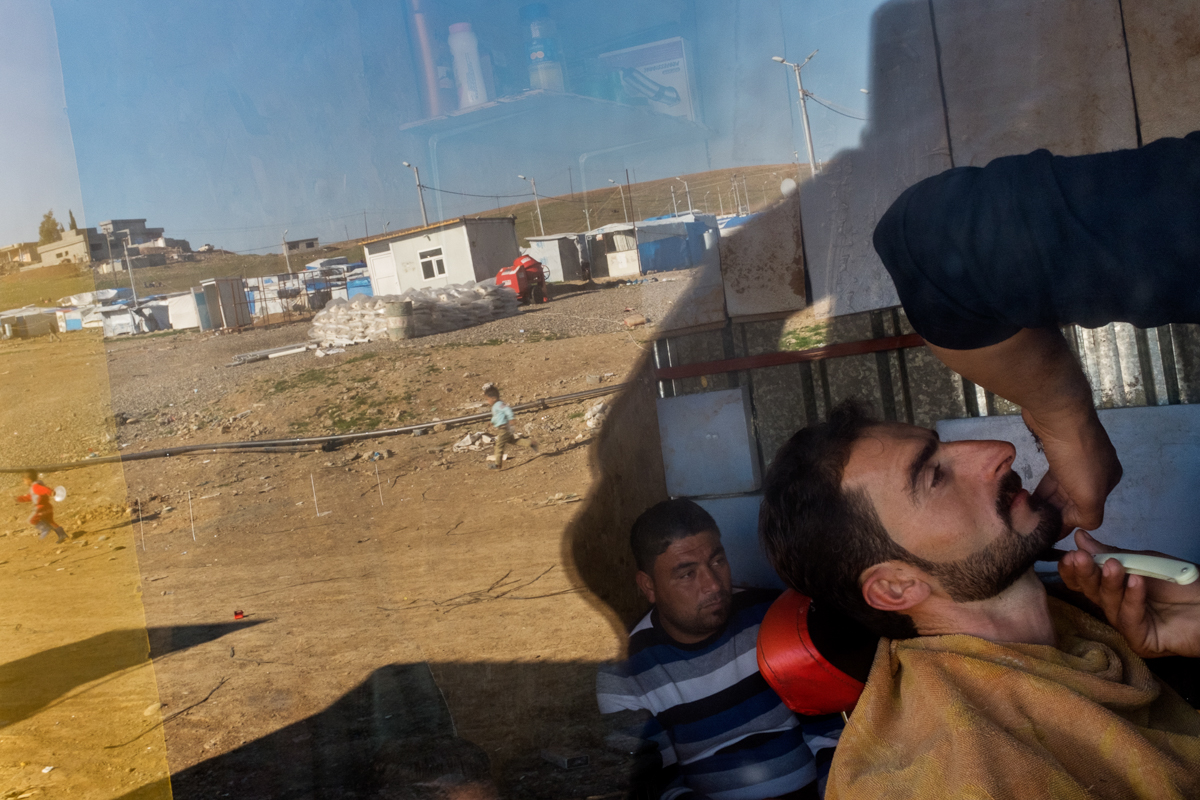
A man receives a shave in a barber shop managed and run by Syrian refugees in the Kawargosk Refugee Camp. Over 10,100 Syrian refugees live in this camp.
Erbil, Iraq. February 15, 2016. © Danish Refugee Council/Eduardo Soteras Jalil
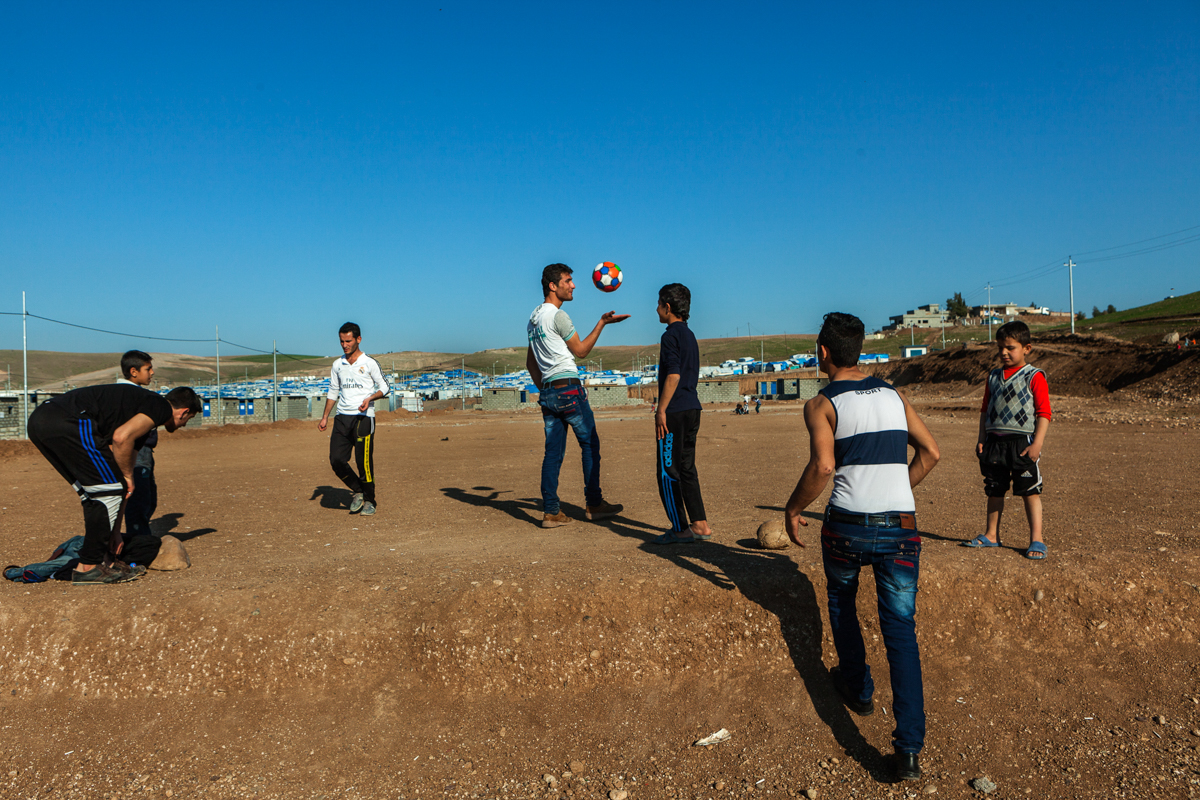
Children and young men play football on a dirt pitch at Kawargosk Refugee Camp.
Erbil, Iraq. February 15, 2016. © Danish Refugee Council/Eduardo Soteras Jalil
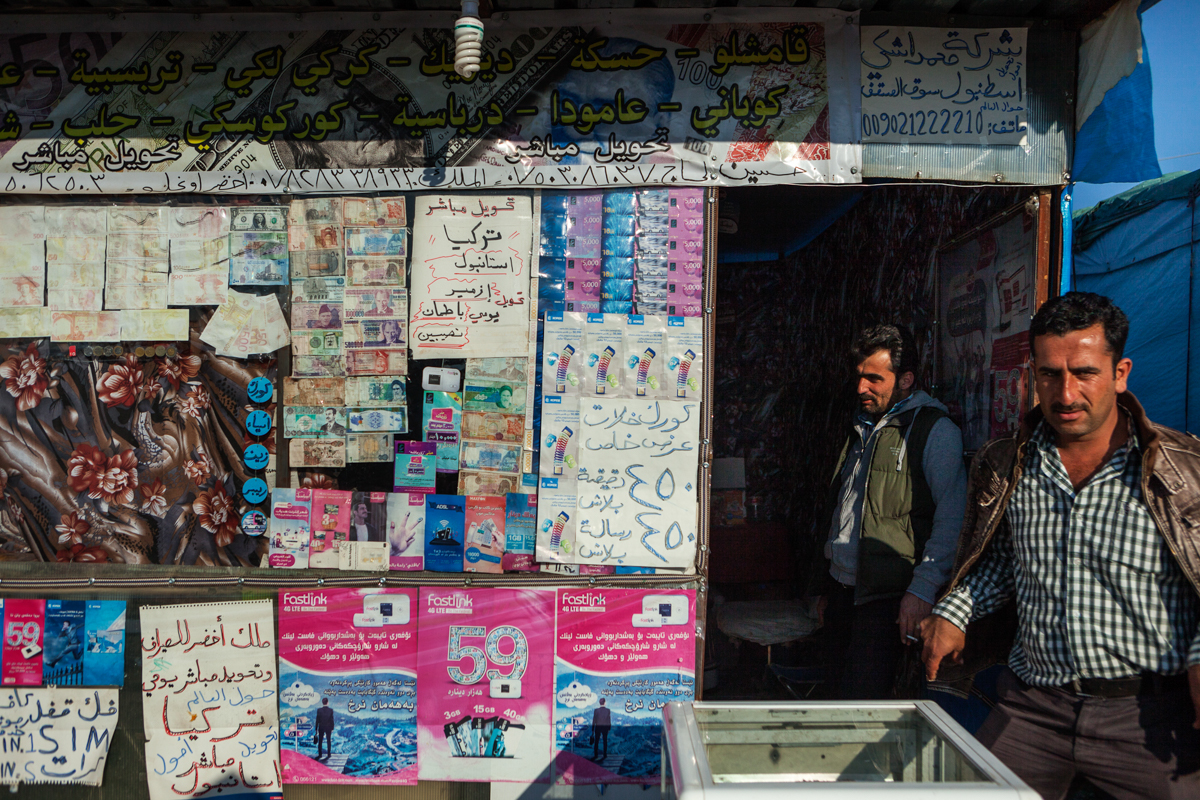
A Syrian man exits a currency exchange shop in Kawargosk Refugee Camp.
Erbil, Iraq. February 15, 2016. © Danish Refugee Council/Eduardo Soteras Jalil
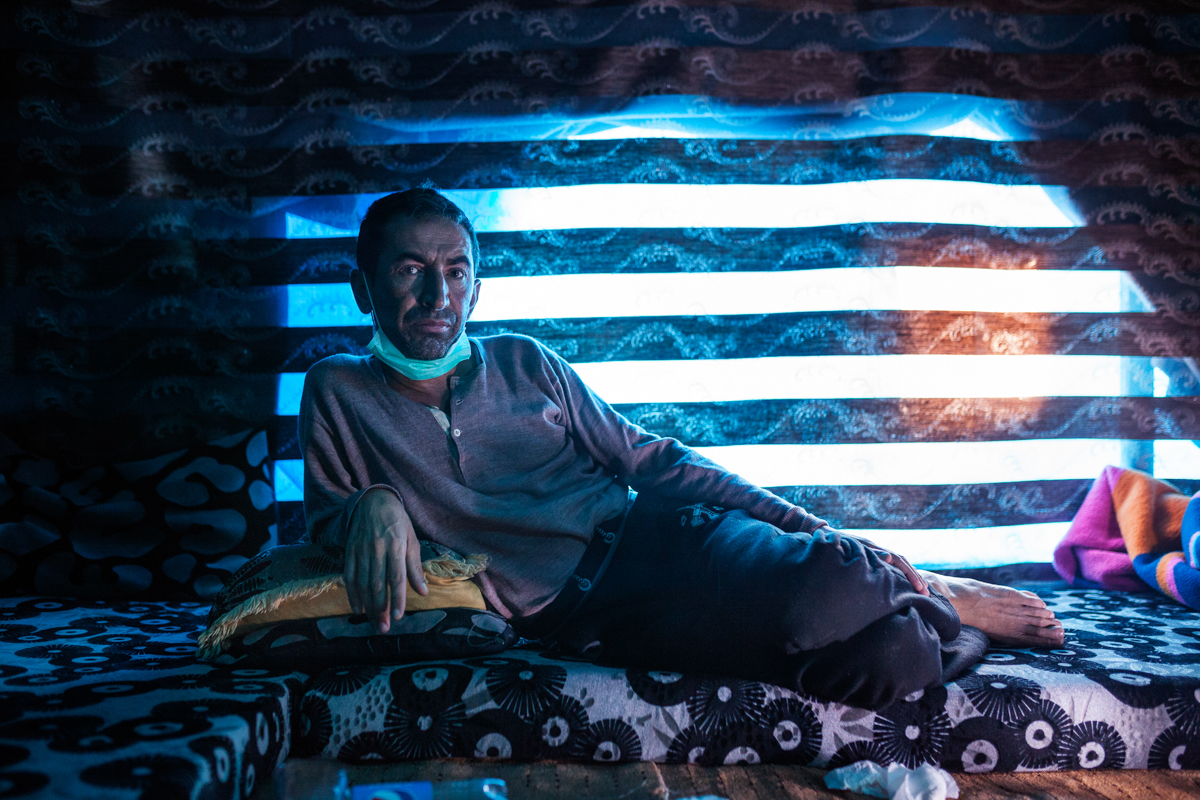
This is Zain Al Sheikh, 38. The father of three young girls made it to Kawergosk Refugee camp in Erbil, KRI, in August 2013, like most of the people in the camp. In 2015, he was diagnosed with cancer. Limited funding for NGOs to provide medical support in camps in KRI has meant Zain has not received medical treatment this year. In addition to millions of displaced Iraqis, it is estimated that 10 million people in Iraq will need some form of humanitarian assistance this year, straining local and international aid agency“s already stretched resources.
Erbil, Iraq. February 15, 2016. © Danish Refugee Council/Eduardo Soteras Jalil
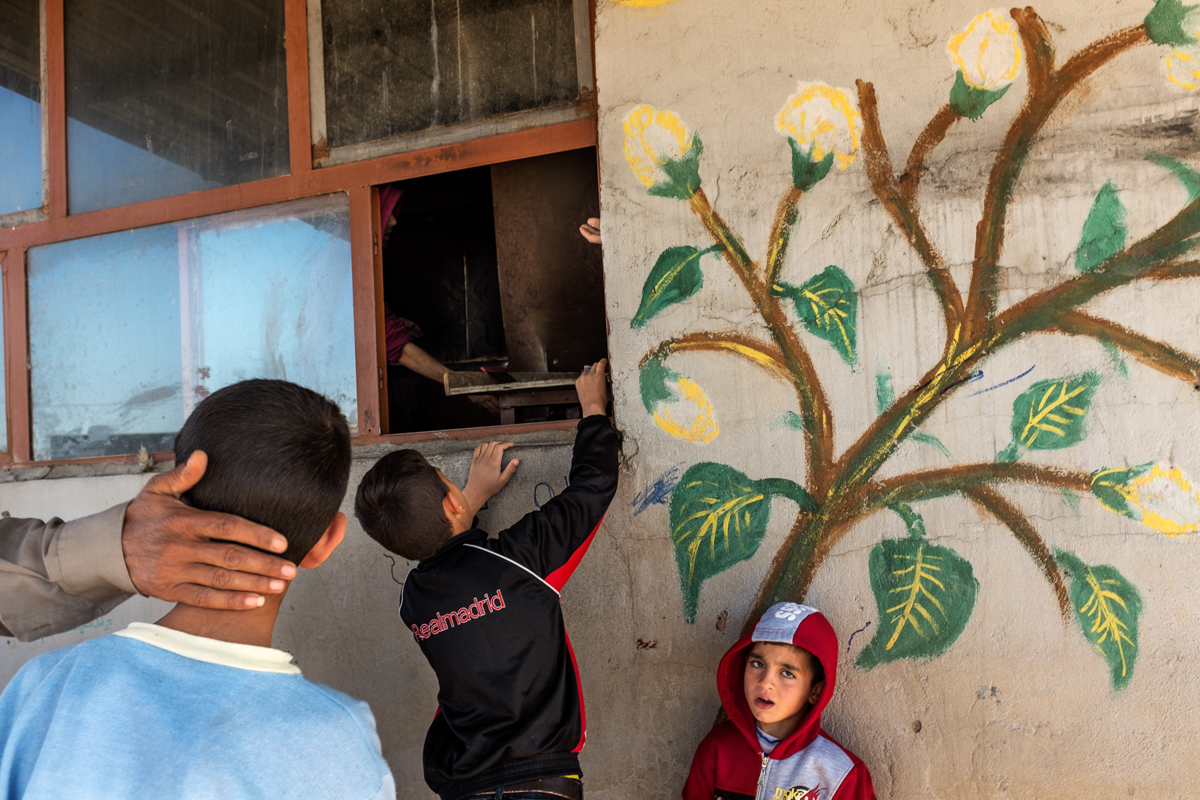
Daily line-up for bread at a bakery in Darashakran Refugee Camp. The camp houses 10,900 Syrians.
Erbil, Iraq. February 16, 2016. © Danish Refugee Council/Eduardo Soteras Jalil
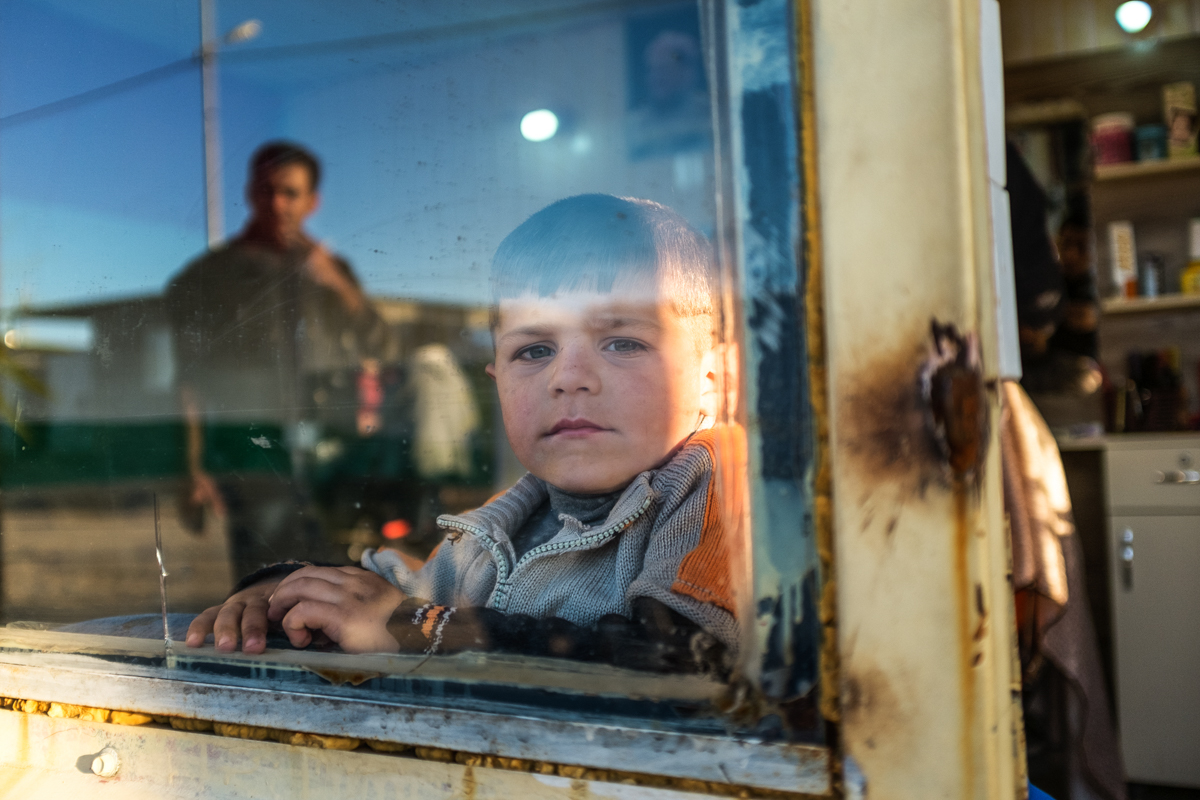
A young Syrian boy, seen through the window of a grocery store. Darashakran Refugee Camp.
Erbil, Iraq. February 16, 2016. © Danish Refugee Council/Eduardo Soteras Jalil
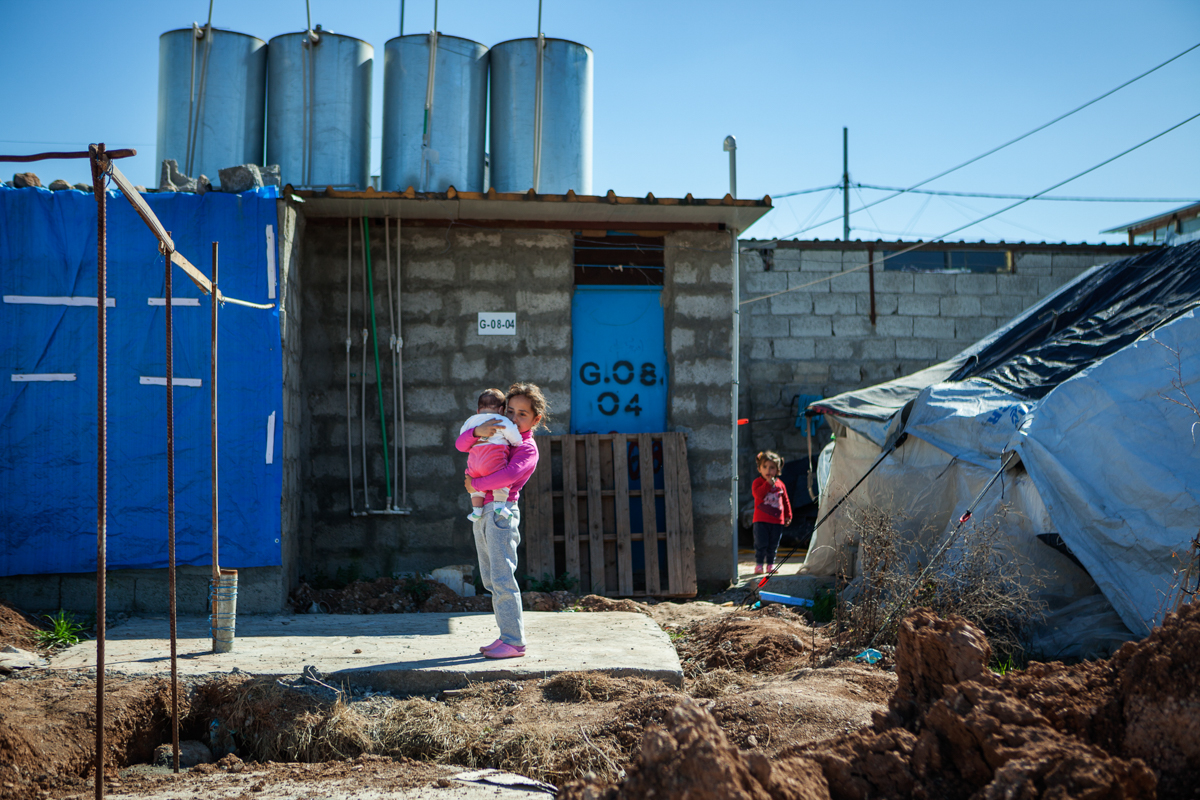
A young girl cradles her infant sister as she stands in front of an upgraded “weather-proof” shelter.
Erbil, Iraq. February 16, 2016. © Danish Refugee Council/Eduardo Soteras Jalil
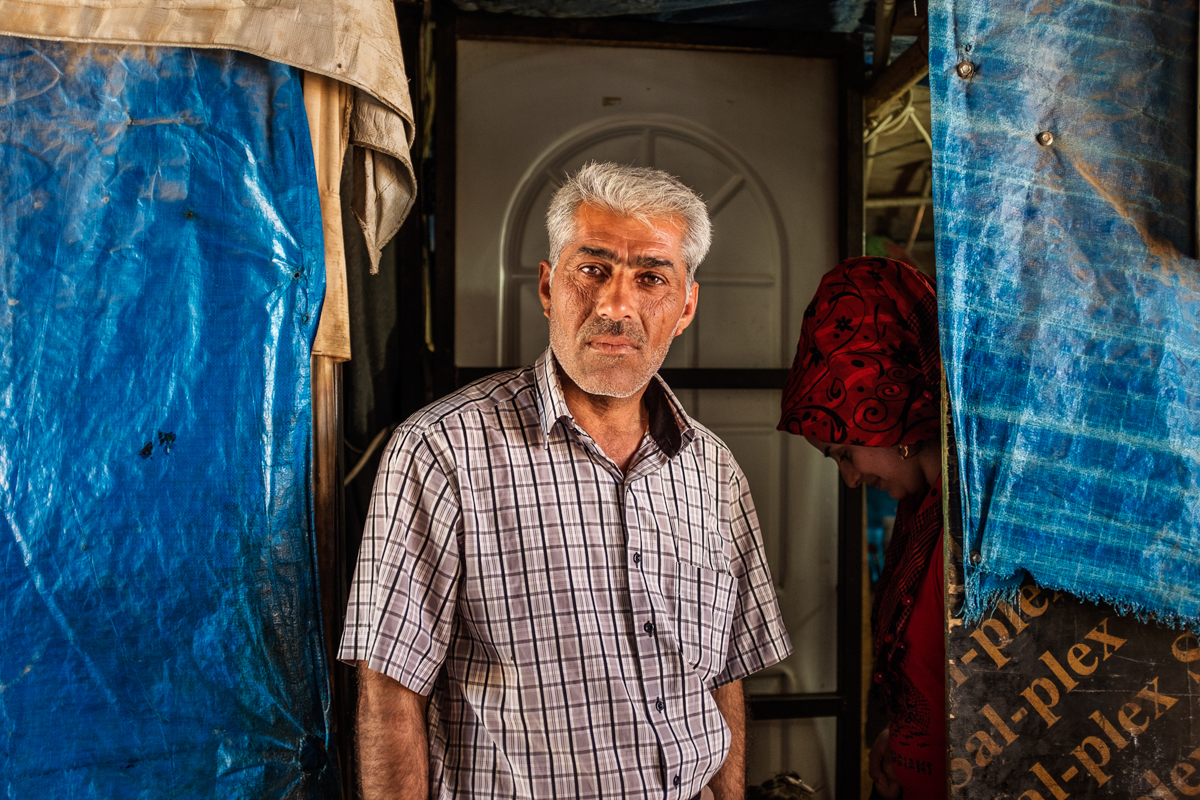
Hissam Ahmad in front of his family’s tent in Qushtapa Refugee Camp, Erbil, KRI. Mr. Ahmad runs a grocery store with a partner, but says the income is not enough to meet the basic needs of his family of nine. Hissam is considering leaving with his family to Europe.
Erbil, Iraq. February 17, 2016. © Danish Refugee Council/Eduardo Soteras Jalil
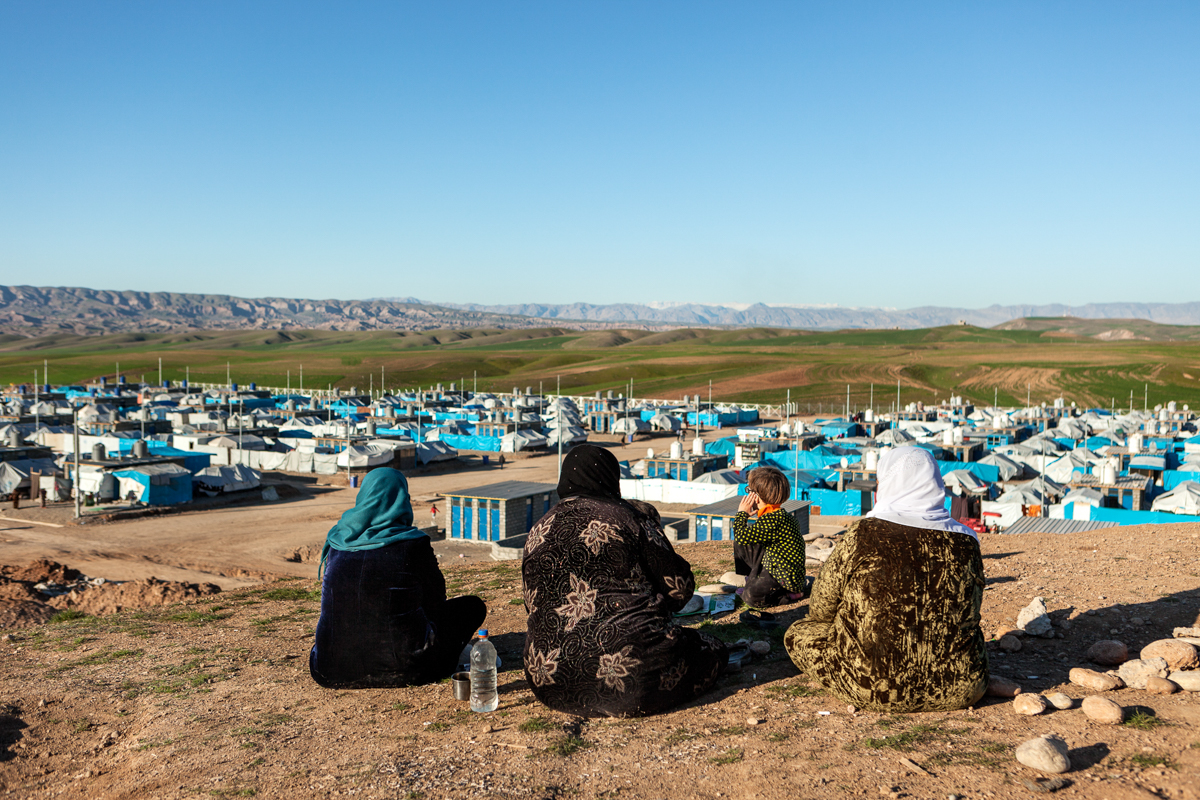
Women and children overlook a part of Darashakran Refugee camp.
Erbil, Iraq. February 16, 2016. © Danish Refugee Council/Eduardo Soteras Jalil
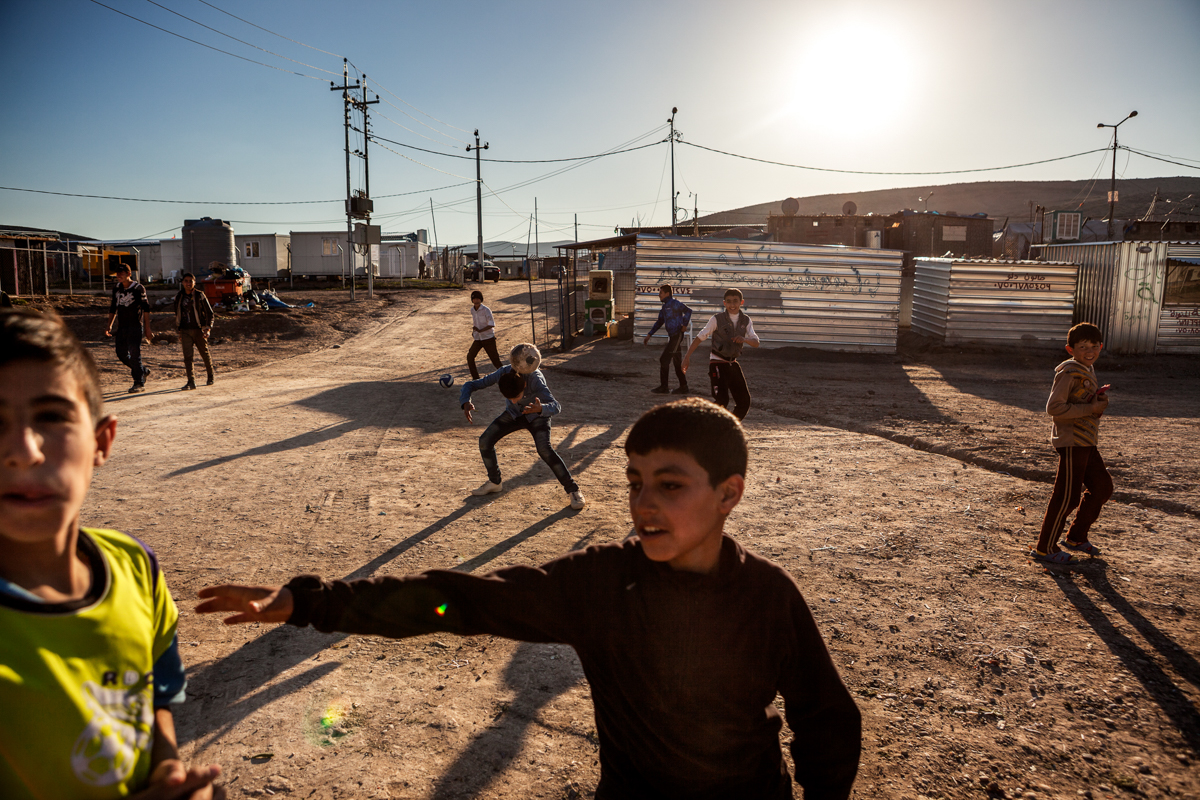
A Syrian boy makes sure his football opponent keeps his distance.
Basherma Refugee Camp, Erbil, Iraq. February 18, 2016. © Danish Refugee Council/Eduardo Soteras Jalil
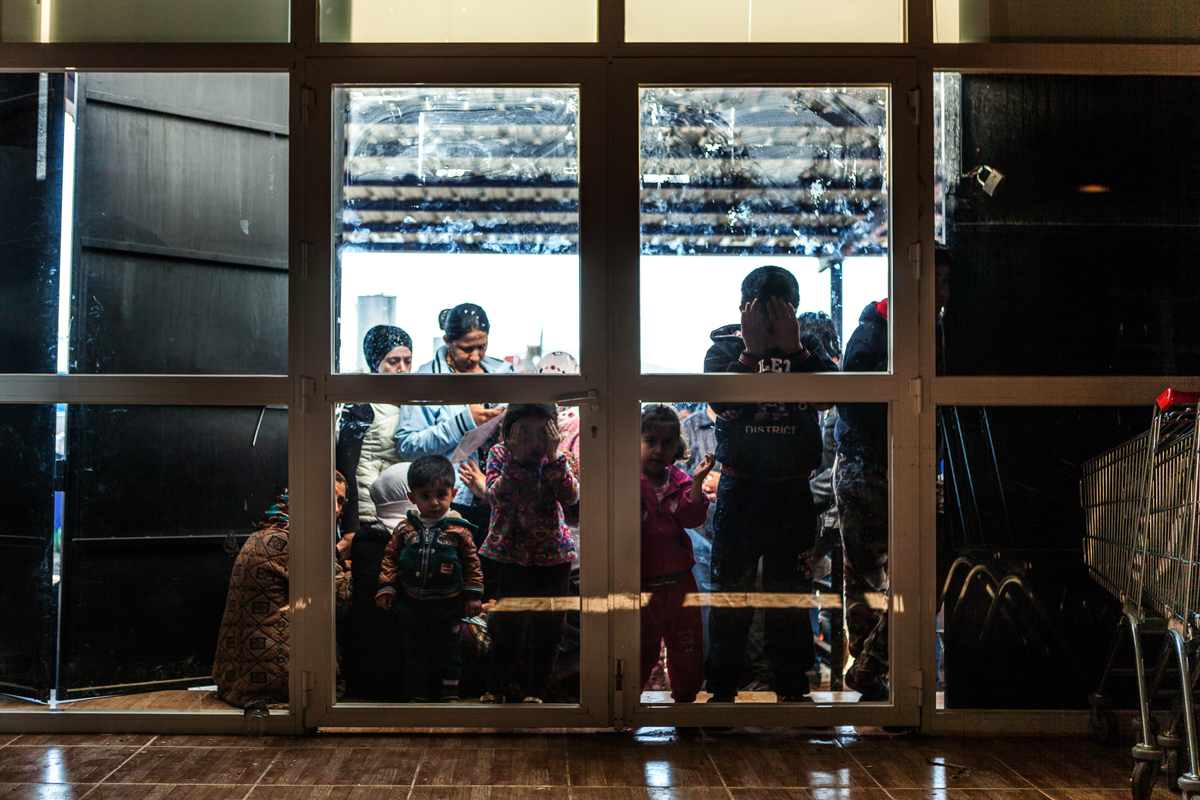
Syrian families wait for a supermarket in Kawargosk Refugee Camp to open. Refugee families dubbed “extremely vulnerable” receive food vouchers from the World Food Program worth USD19 per person per month, while those categorised as “vulnerable” get USD10 per person, per month.
Kawargosk Refugee Camp, Erbil, Iraq. February 15, 2016. © Danish Refugee Council/Eduardo Soteras Jalil
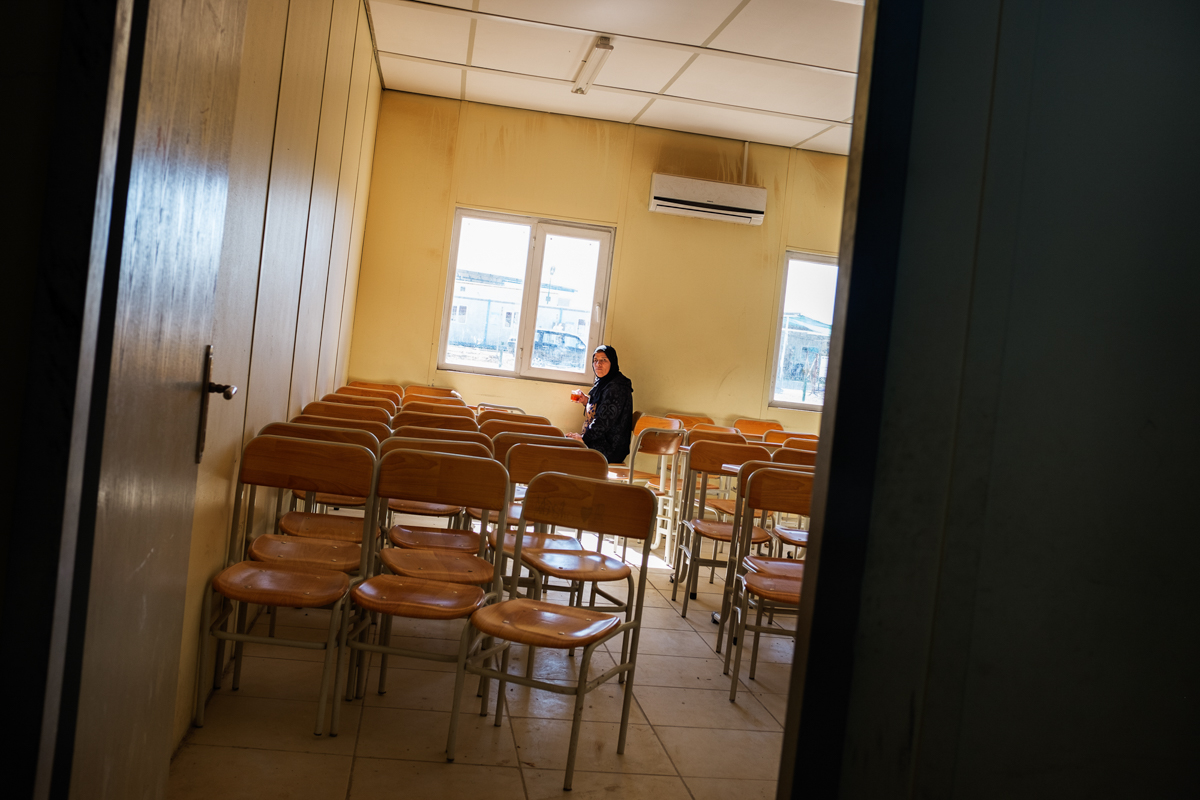
A secondary school teacher sits alone in an empty classroom in Qushtapa Refugee Camp. The secondary school was only able to open at the close of 2015, but pupils remain few with many youngsters having already left for Europe, according to the teacher.
Erbil, Iraq. February 17, 2016. © Danish Refugee Council/Eduardo Soteras Jalil
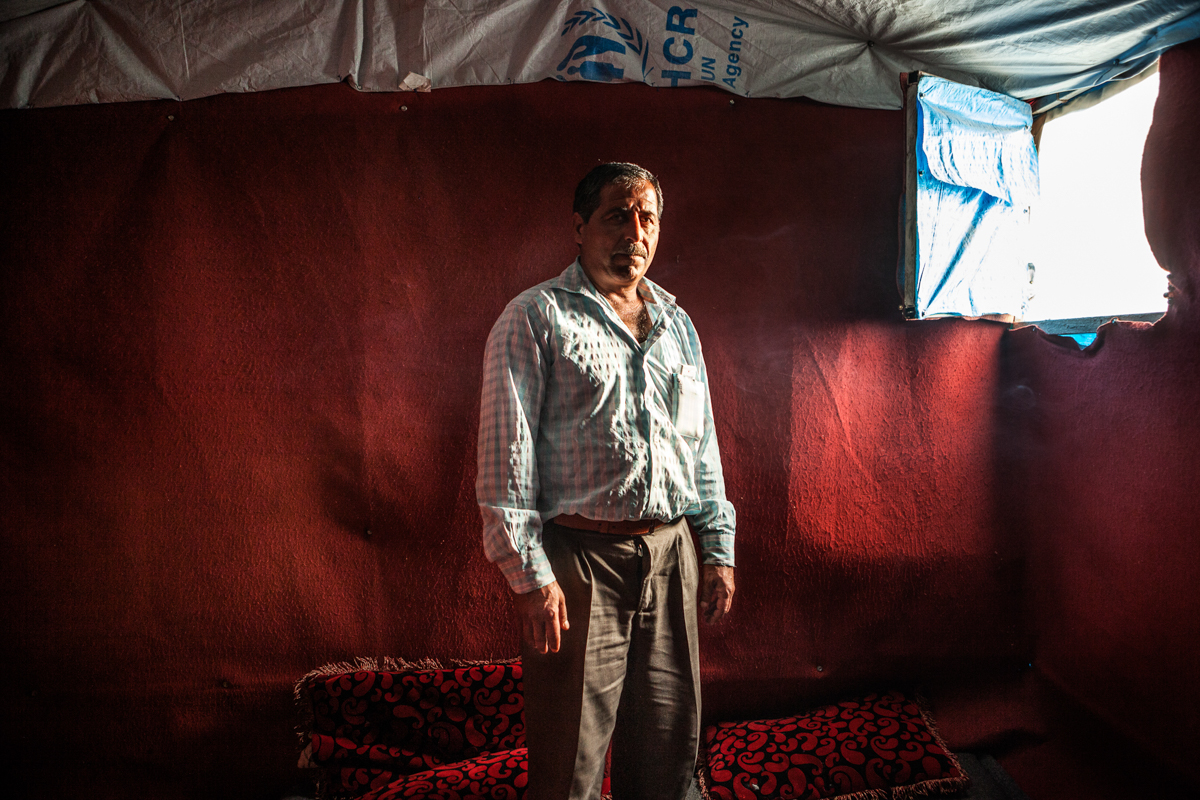
Mohammed-Hanifa Omar, 47, former owner of a heavy machinery company in Syria, in his tent in Basherma Refugee Camp.
Erbil, Iraq. February 17, 2016. © Danish Refugee Council/Eduardo Soteras Jalil
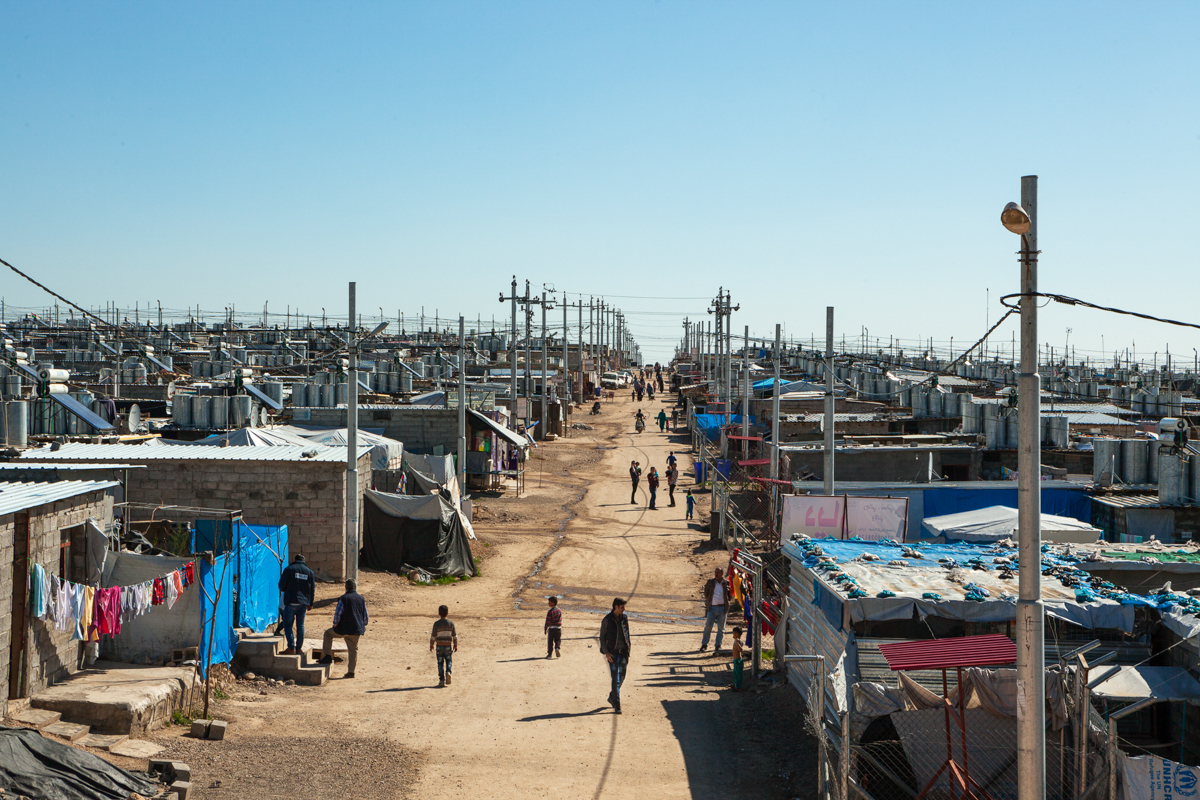
Street life in what is considered a “five star” camp, Darashakran Refugee Camp.
Erbil, Iraq. February 16, 2016. © Danish Refugee Council/Eduardo Soteras Jalil
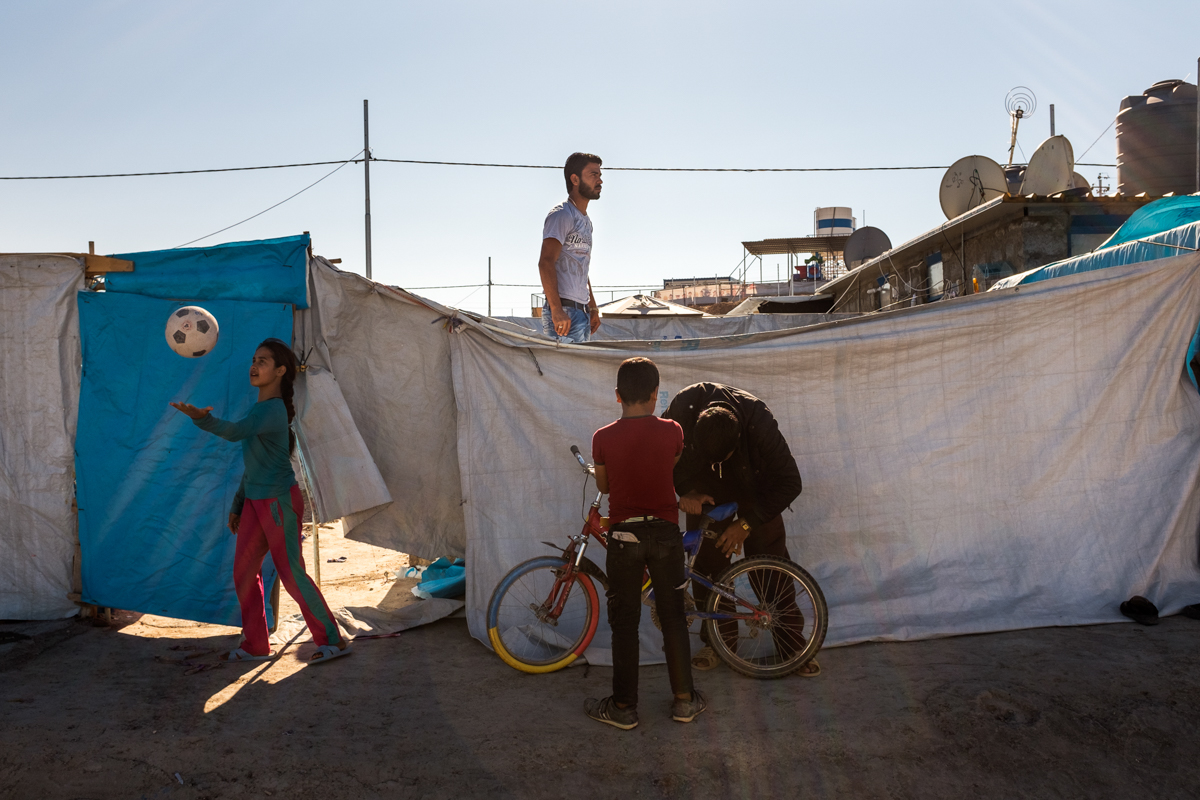
A family in front of their tent in Darashakran Refugee Camp.
Erbil, Iraq. February 16, 2016. © Danish Refugee Council/Eduardo Soteras Jalil
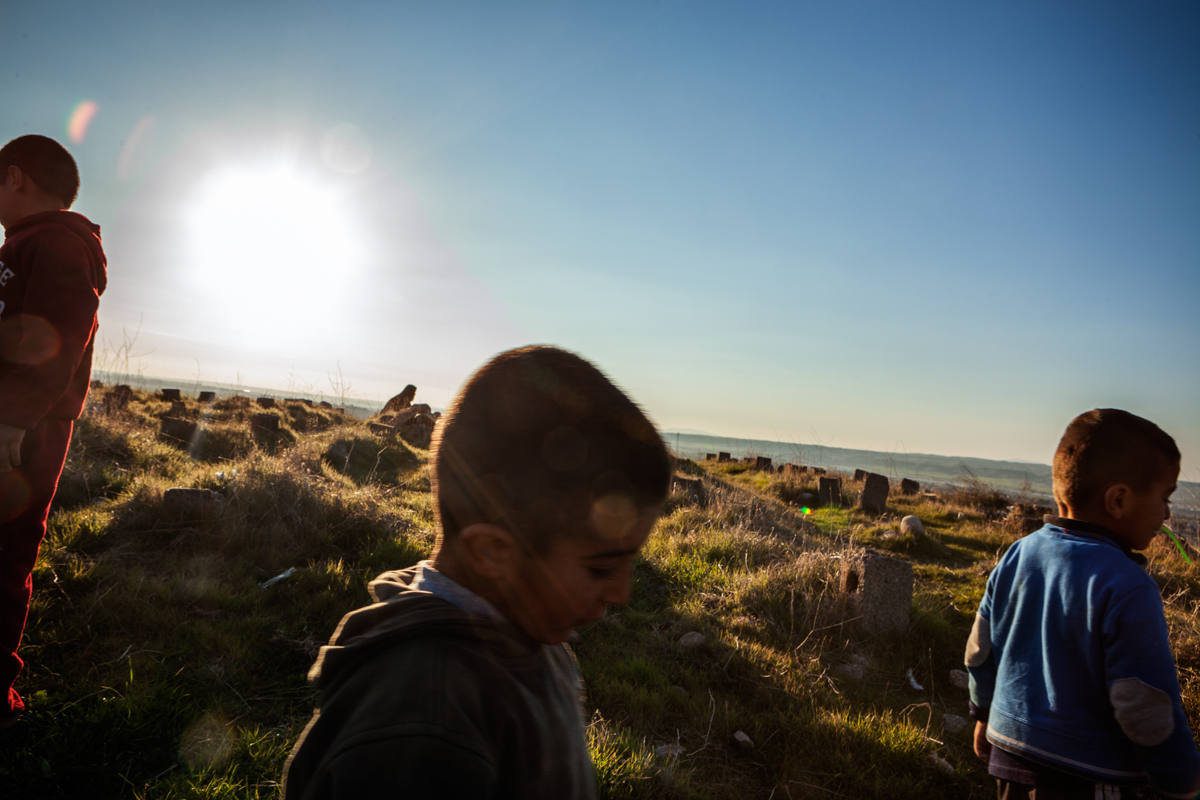
Syrian children play in a local graveyard on the perimeter of the Kawargosk Refugee Camp.
Erbil, Iraq. February 15, 2016. © Danish Refugee Council/Eduardo Soteras Jalil
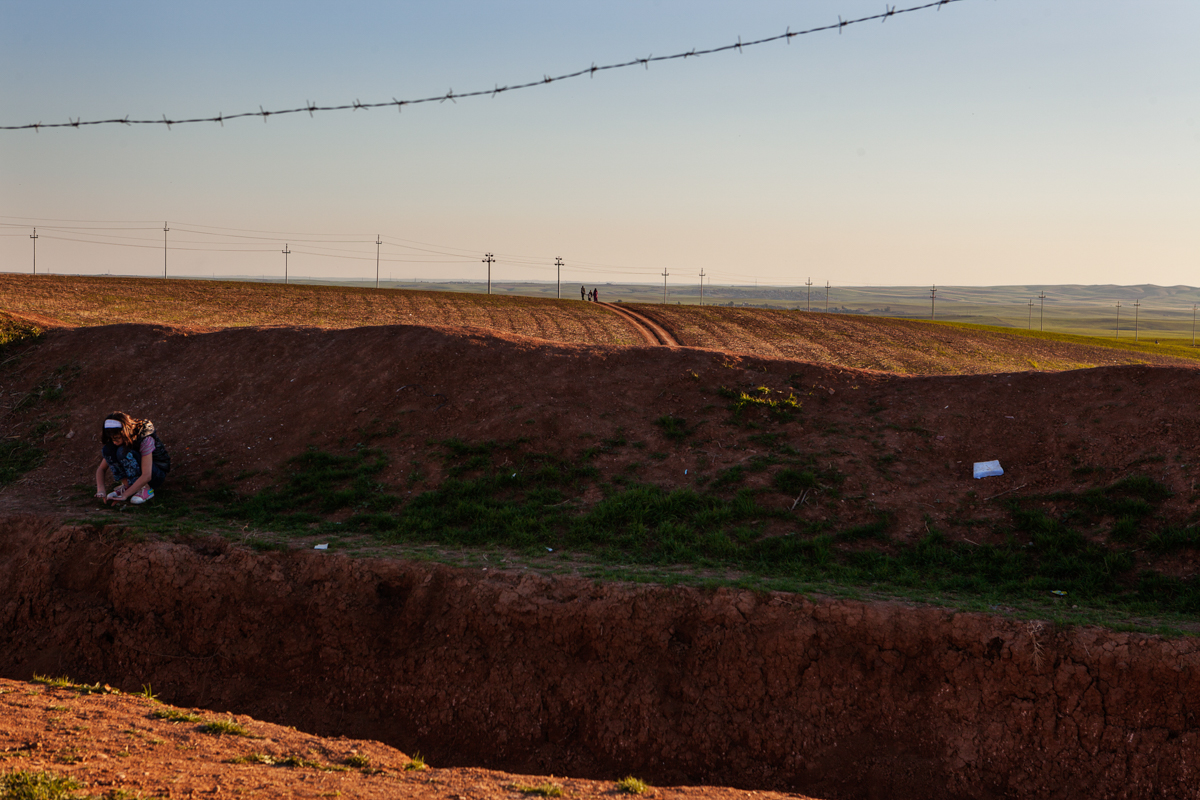
A young girl plays alone in a dry water drain on the outskirts of Darashakran Refugee Camp.
Erbil, Iraq. February 16, 2016. © Danish Refugee Council/Eduardo Soteras Jalil
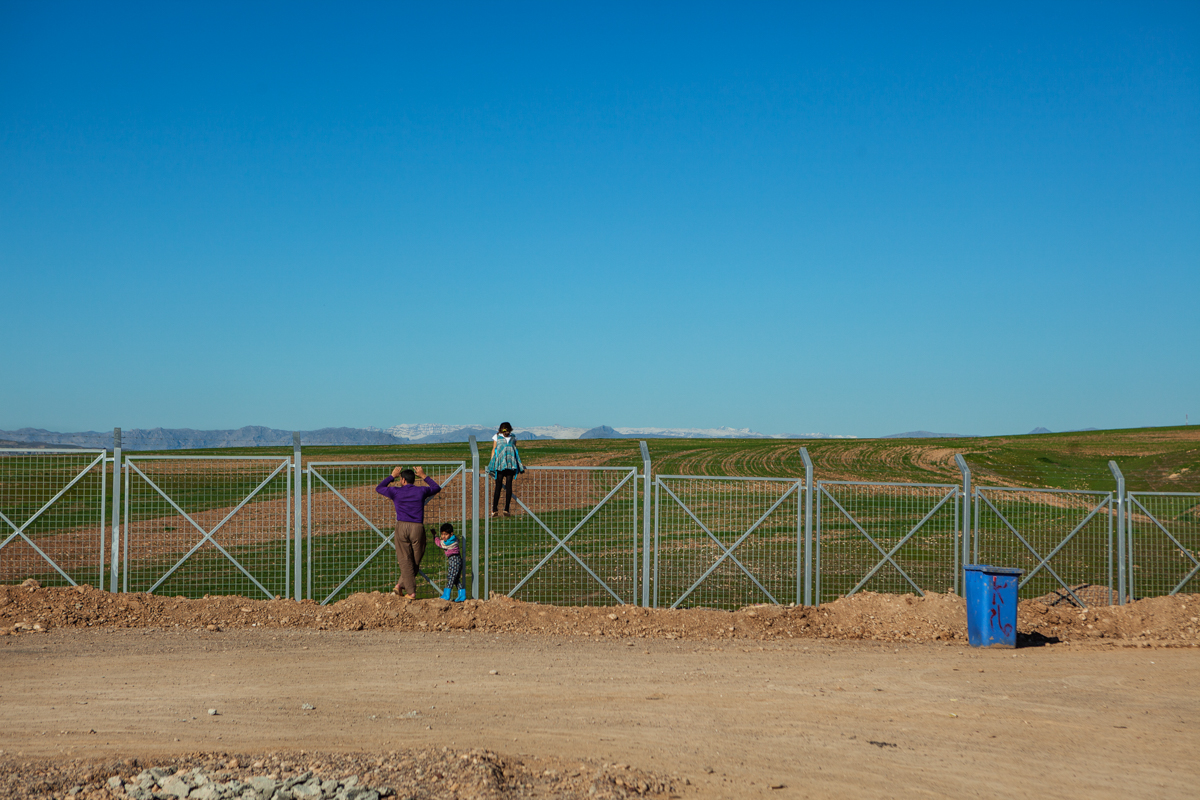
Siblings look through the perimeter fence of Darashakran Refugee camp to surrounding wheat fields.
Erbil, Iraq. February 16, 2016. © Danish Refugee Council/Eduardo Soteras Jalil
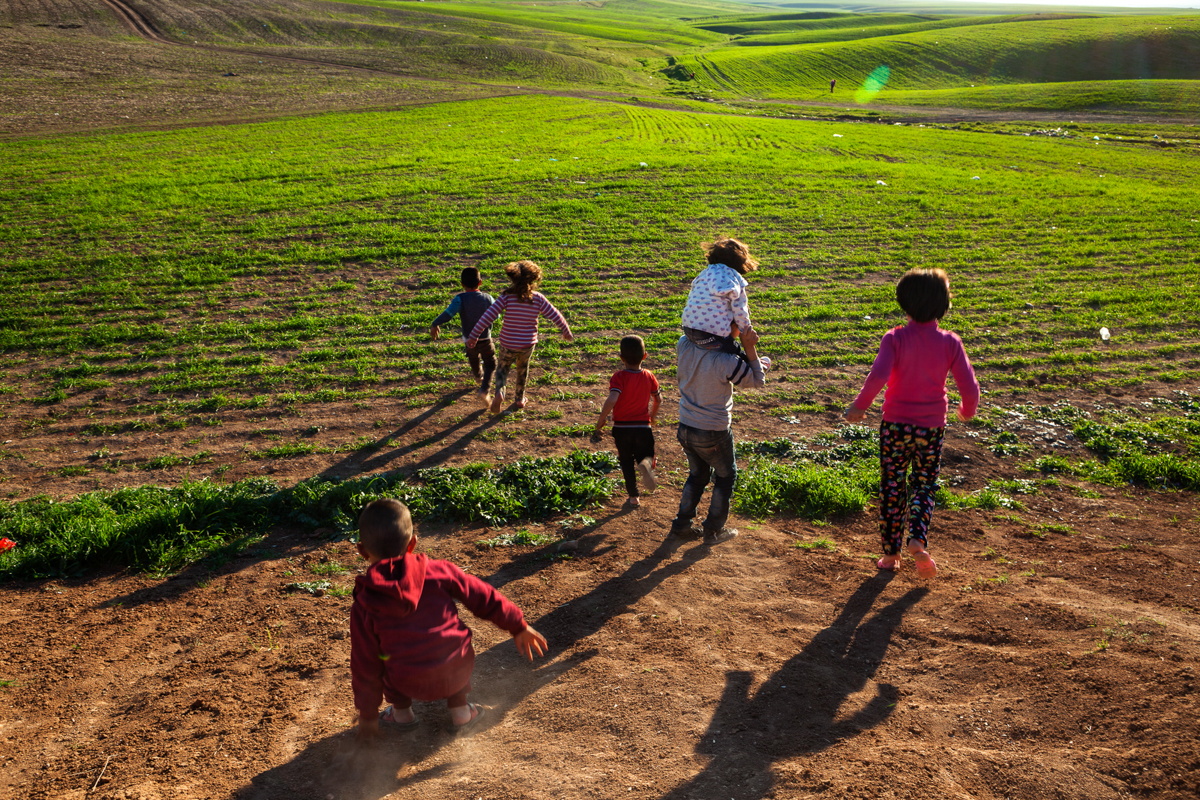
Children run freely along the banks of a dry water drain, Darashakran Refugee Camp.
Erbil, Iraq. February 16, 2016. © Danish Refugee Council/Eduardo Soteras Jalil
Danish Refugee Council
The Danish Refugee Council (DRC) is a humanitarian, non-governmental, non-profit organisation founded in 1956 that works in more than 39 countries throughout the world. DRC fulfils its mandate by providing direct assistance to conflict-affected populations- refugees, internally displaced people (IDPs) and host communities in the conflict areas of the world and by advocating on their behalf internationally and in Denmark.
DRC’s vision for the regional programme in the Middle East and North Africa reflects the global vision to work towards the protection and promotion of durable solutions to refugee and displacement problems, on the basis of humanitarian principles and human rights. The overall goal of DRC’s strategy for the Middle East and North Africa is: to support and strengthen a regional protection framework for displacement-affected communities throughout the Middle East and North Africa.
Danish Refugee Council - Lebanon
In 2003, following the advent of military operations in Iraq, DRC became one of the first organisations to provide humanitarian assistance, opening an office in Diyala and soon after in Basra. Today, DRC Iraq has extended its operations to nine governorates across the country with offices based in Anbar, Baghdad, Dohuk, Erbil, Karbala, Kirkuk and Najaf. Key program areas include; Emergency Response and Preparedness, Camp Coordination and Camp Management (CCCM), Protection, Sustainable Livelihoods and Social Cohesion, Water, Sanitation and Hygiene (WASH) and Shelter. The program manages four Syrian refugee camps with UNHCR in the KRI.